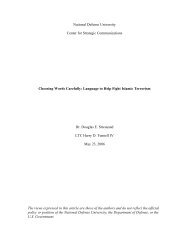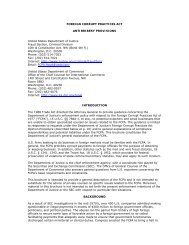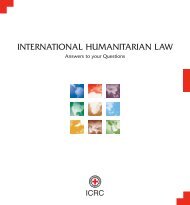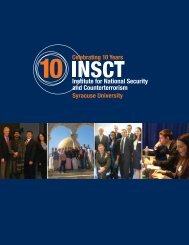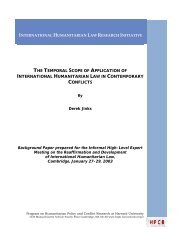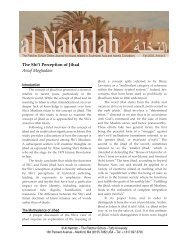some reflection on post-enlightenment qur'anic hermeneutics
some reflection on post-enlightenment qur'anic hermeneutics
some reflection on post-enlightenment qur'anic hermeneutics
You also want an ePaper? Increase the reach of your titles
YUMPU automatically turns print PDFs into web optimized ePapers that Google loves.
Special] Post-Enlightenment Qur’anic Hermeneutics 1439The seventh century Qur’anic c<strong>on</strong>text of slavery is thus unequivocal.Yet, Muslim jurists, applying these verses to c<strong>on</strong>temporary circumstances,are unanimous in c<strong>on</strong>cluding that such relati<strong>on</strong>ships are no l<strong>on</strong>ger permittedby Islamic law and that the text is an anachr<strong>on</strong>ism or “obsolete.” 146 All ofthe important examples for this interpretati<strong>on</strong> come from the Post-Enlightenment hermeneutical literature, yet such interpretati<strong>on</strong>s have beenreadily and unquesti<strong>on</strong>ably accepted by even the traditi<strong>on</strong>alist commentators.Two examples from the Post-Enlightenment hermeneutical literatureare instructive. Muhammad Rashid Rida, writing in the early twentieth century,referred to the emancipatory and liberal treatment of slaves mandatedby the Qur’an and argued that the eliminati<strong>on</strong> of slavery was therefore <strong>on</strong>eof the purposes of the Qur’anic revelati<strong>on</strong>. 147 In coming to this c<strong>on</strong>clusi<strong>on</strong>,he cited examples from the history of aboliti<strong>on</strong> in the Americas and in Sudanand suggested that the aboliti<strong>on</strong> of slavery must, of necessity, be agradual affair. 148 Sayyid Qutb, in his famous commentary <strong>on</strong> the Qur’an,similarly argues that the Qur’an mandates a struggle to establish a virtuoussociety. 149 This struggle springs <strong>on</strong>ly from piety, and in that spirit, suchpiety requires the freeing of slaves. 150 The virtuous society is thus <strong>on</strong>e thatis slavery-free. 151146. See THE MEANING OF THE HOLY QUR’AN, supra note 75, at 875 n.2991 (commentingthat slavery is now “obsolete”); ASAD, supra note 76, at 540 n.46 (asserting thatslavery can be no more); AHMAD IBN NAQIB AL-MISRI, RELIANCE OF THE TRAVELER 458-59(Nuh Ha Mim Keller ed. & trans., rev. ed. 1994) (observing that slavery is a dead letter).147. See RIDA, supra note 3, at 143-45.148. See id. at 143.149. QUTB, IN THE SHADE OF THE QUR’AN, supra note 3, at 176-79 (commenting <strong>on</strong>Sura ul-Balad).150. Id.151. Id. In recent times a number of other commentators have also made this argument.The British aboliti<strong>on</strong>ist C.W.W. Greenidge, in his important book <strong>on</strong> slavery, makesthe same argument and cites a number of sources as support. See C.W.W. GREENIDGE,SLAVERY 58-65 (1958). He makes extensive use of the argument of Syed Ameer Ali, theIndian Islamic modernist, and he quotes Eld<strong>on</strong> Rutter, who remarked “The Koran rightlypractised would so<strong>on</strong> bring about the complete cessati<strong>on</strong> of slavery.” Id. at 65 (quotingEld<strong>on</strong> Rutter in The Holy Cities of Arabia). He also quotes Bertram Thomas, who said: “Inthe unabatement of slavery Arabia has been false to her Prophet.” Id. (quoting BertramThomas in The Arabs). Greenidge also quotes an Imam, Dr. H. Ghoraba, who gave a serm<strong>on</strong>in which “he quoted with approval ‘a great Moslem scholar [unnamed, but likely RashidRida], who claimed that meditati<strong>on</strong> up<strong>on</strong> the policy of Islam would prove that Islam came toabolish slavery in spite of its recogniti<strong>on</strong> of it.’” Id. (quoting H. Ghoraba). Verse 4:36 inSura An-Nisa exhorts the believers to “[b]e good to [their] parents, to relatives, to orphans, tothe needy, to neighbours near and far, to travellers in need, and to [their] slaves.” The HolyQur’an, Sura An-Nisa 4:36 (translated by author). The modern Qur’an commentator MuhammadAsad asserts that this verse is also an exhortati<strong>on</strong> to seek the aboliti<strong>on</strong> of slaveryand maintains that Muhmmad ‘Abduh held a similar positi<strong>on</strong>. See ASAD, supra note 76, at110 n.48.



